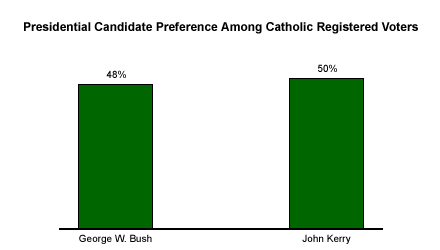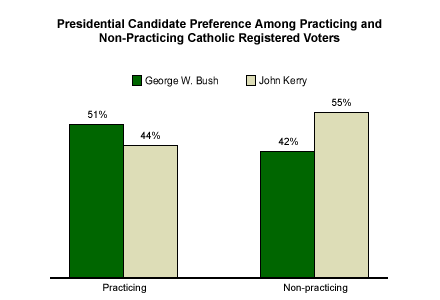The Catholic vote is one of the most sought after by the presidential candidates this year, for many reasons. First, Catholics as a whole represent 25% of the American population, making them one of the larger demographic subgroups in the electorate. Second, many of the key swing states this year, such as Ohio, Pennsylvania, and Wisconsin, have substantial Catholic populations. Third, Catholics tend to be a bellwether group in the electorate, preferring the popular vote winner in all but one election since 1972 (the exception being the 1988 election). ║┌┴¤═° Poll data show that in this year's election, the Catholic vote is currently divided about evenly between Republican President George W. Bush and Democratic challenger John Kerry.
According to the latest CNN/USA Today/║┌┴¤═° election poll, conducted Oct. 22-24, the candidates are essentially tied among Catholic registered voters, with 50% saying they support Kerry and 48% Bush*.

Those results are similar to ║┌┴¤═°'s estimate of the Catholic vote in 2000, when Catholics supported Al Gore by a 52% to 46% margin over Bush.
Kerry's Faith
In this year's election, the Catholic vote takes on added significance because Kerry himself is Catholic, the first major-party nominee of that faith since John Kennedy in 1960. Kerry mentioned his religious faith in the second debate and talked about it extensively during the third and final presidential debate, talking about his service as an altar boy but making it clear that he did not allow his religious beliefs to determine his policy positions on controversial issues.
It is unclear whether speaking of his Catholic background helped Kerry among Catholics. The data suggest that Catholic support for Kerry increased marginally from the Oct. 9-10 poll, conducted before the third debate -- compared with his support in the Oct. 14-16 poll, conducted after that debate. In the earlier poll, Catholic registered voters supported Bush by a 50% to 45% margin, compared with a 48% to 47% Kerry advantage in the second poll. However, those changes are within the margins of error of those two Catholic samples. But the latest poll is more in line with the post-debate poll, suggesting any additional support Kerry gained among Catholics has persisted.
Practicing vs. Non-Practicing Catholics
Prior ║┌┴¤═° analysis this year showed that Bush's support was higher among practicing Catholics (defined as those who attend church at least monthly), while Kerry tended to poll better among non-practicing Catholics (those who seldom or never go to church). In the most recent data, that relationship still exists.
According to the new data, practicing Catholics support Bush by a slight 51% to 44% margin. However, among the most committed Catholics, those who attend church every week, the candidates are essentially tied, with 49% supporting Bush and 47% Kerry. Non-practicing Catholics prefer Kerry by a wide 55% to 42% margin.

Bottom Line
The data suggest that if the election were held today, the Catholic vote would be evenly divided between Bush and Kerry. Whether that pattern holds over the final week of the campaign remains to be seen, but all indications are that Catholics will again be a key bellwether voting bloc. Given the closeness of the election, the ultimate outcome of the Catholic vote may help to tip the scale in one or the other candidate's favor.
*Based on interviews with 381 Catholic registered voters, in interviews conducted in nationally representative samples of adults, aged 18 and older, Oct. 22-24. For results based on this sample, the maximum margin of error attributable to sampling is ±6 percentage points.
The sample of 411 Catholic registered voters who attend church on at least a monthly basis is based on interviews conducted in Oct. 14-16 and 22-24 polls. For this sample, the maximum margin of sampling error is ±5 percentage points.
For the sample of 200 Catholic registered voters who seldom or never attend church, the maximum margin of sampling error is ±8 percentage points.